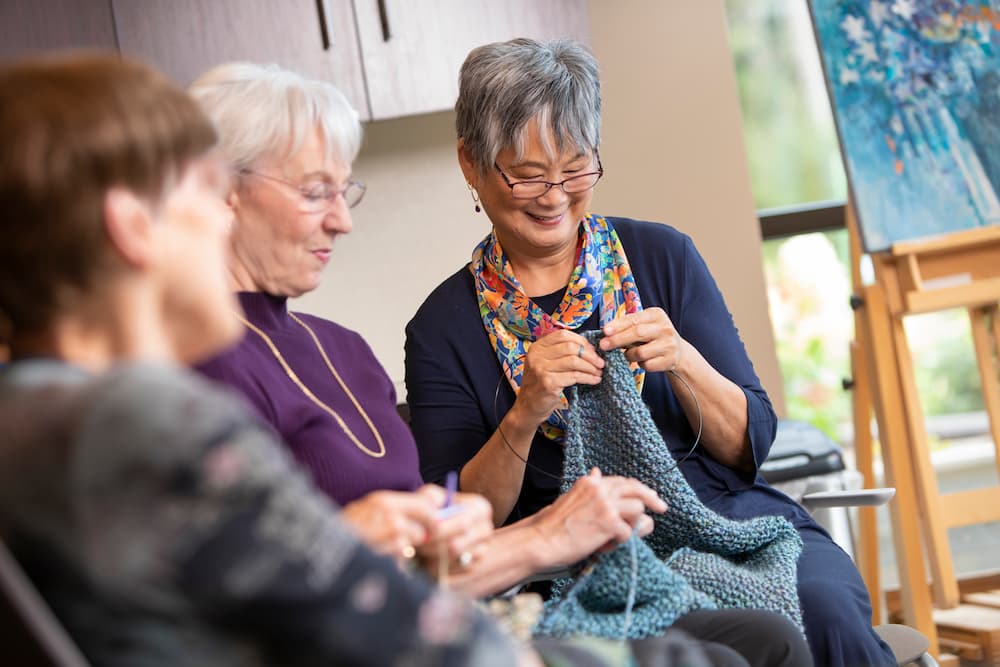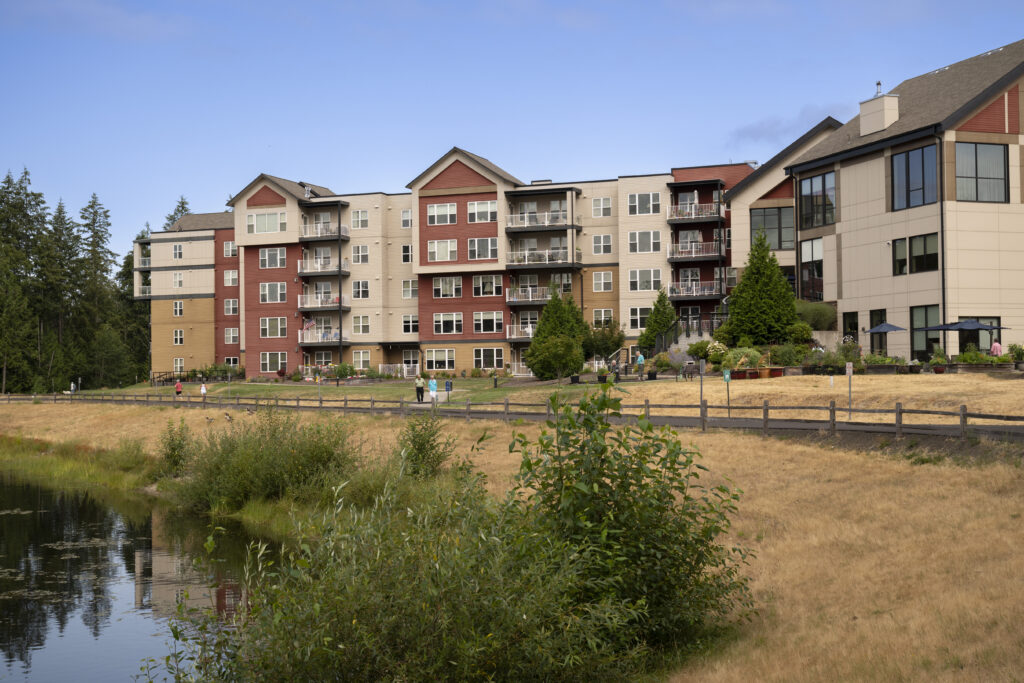Whether you’re considering a move to a retirement community for yourself or a family member, one of the first questions you’ve probably thought about is how old do you have to be to live in a senior community?
Senior living age requirements vary by community, but most communities have a minimum age threshold of at least 55 or 62. Exceptions are sometimes made for younger spouses or for other family members, depending on circumstances.
You might wonder why someone who’s relatively young would want to live in a senior community. The truth is there are many reasons, and it’s more common than you may think. Plus, you don’t actually have to be retired to live in a retirement community.
Average Age at Move-In Varies by Community Type
It helps to understand that independent living is different from assisted living and other higher levels of care offered in some senior living communities. Independent living is for older adults who don’t require regular assistance with routine tasks such as personal hygiene.
Assisted living is for those who need a little help with usual daily activities—like bathing, dressing or moving around. Otherwise, seniors in assisted living communities are similar to their peers in independent living.
Some communities offer both independent living and assisted living, and some offer additional levels of care as well, including memory support, skilled nursing and rehabilitation therapy following surgery, illness or injury.
Many—but not all—communities that offer independent living and additional levels of care require new residents to be eligible for independent living when they move in, which skews the average age at move-in downward for these communities.
But we’re also seeing a shift toward younger seniors choosing to move to an independent living community.
In truth, there’s no magic number when it comes to the best age for senior living—in part because the aging process affects people so differently.
The right time to move depends more on your health status, lifestyle and personal objectives than on the number of years since you were born.
Misperceptions About Independent Living Lead to Delays in Moving
It’s common for older adults to put off even thinking about moving to a senior living community. Some simply want to stay in their current home as long as they can. Others procrastinate because they believe there’s plenty of time to plan for what may lie ahead.
Independent living communities offer an environment in which seniors can thrive, spending their time engaged in activities they enjoy instead of mundane household chores. Residents have easy access to nutritious meals throughout the day, so if they don’t feel like cooking, they don’t have to. In some communities, the food rivals what you’d expect in a fine dining restaurant.
Many seniors find they’re far more active after moving to an independent living community. They can participate in a variety of exercise classes tailored to their abilities, and many communities have fitness specialists on staff. Other activities provide intellectual stimulation, opportunities to explore new interests and social connections through which friendships can grow.
The older we get, the more challenging it can be to make a big change—like moving to a new community. But when you realize that independent living means leaving behind the drudgery and responsibility of maintaining a home that may no longer suit you and opening your world up to a broad assortment of positive experiences, you may find you’re excited at the prospect!
A common refrain among people who move to independent living communities, once they’ve had a chance to settle in and become familiar with their new lifestyle, is they wish they’d moved sooner. We hear remarks to that effect frequently.
We’ve also heard anecdotes about people who moved into independent living as soon as they could after reaching the age requirement for senior living. They were eager to embrace the convenience, the security and the many other advantages of independent living.
Are You Ready for Independent Living?
Rather than setting a specific age as your target, you may want to use your responses to these questions as a guide for determining the best time to move to an independent living community.
- Is your home becoming more of a burden than a refuge? Is it getting to be more than you can manage?
- How’s your health and your family history? Do you foresee any significant challenges in the next few years?
- Are you content with your current lifestyle or would you like more options for socializing, recreation and expanding your horizons?
- Would you be more physically active if you had easier access to a fitness center and/or other people around who are similar in age to motivate you?
- Do you feel safe in your home?
- Are you tired of cooking or is it getting harder to prepare your own meals?
- Do you plan to travel more in the years ahead? (Independent living gives you the flexibility to leave whenever you like and stay as long as you want, without having to worry about your home while you’re away.)
- Would you like to widen your social circle?
- Could you benefit from downsizing and streamlining your living environment?
Reasons Not To Wait
Life happens, and changes can occur suddenly. Moving to an independent community that also offers additional levels of care gives you more control over where you will live if you should happen to need assisted living or memory care later on.
If you wait until your health needs change, your choices may be limited—and someone else may have to make those important decisions on your behalf. Squaring away those issues now can give you and your loved ones considerable peace of mind.
And if you wait until a decline in health forces you to move, you may not get the full enjoyment of all of the benefits of being in a senior living community.
By deciding to move to an independent living community sooner rather than later, you’ll be giving yourself more time to find a community that truly suits you. Then, you can start living your best life right away, on your terms. You’ll be part of a community where you can age in place comfortably, knowing your care needs down the road will be met.
Independent Living at Heron’s Key
Compared with other senior living communities in our region, we tend to attract younger residents—and it shows. They’re energetic. They’re involved, not just here in our community but also in the larger Gig Harbor community. They volunteer. They start new resident-led interest groups. They participate in, and get loads of satisfaction out of, life.
Along with independent living, we offer assisted living, skilled nursing and rehabilitation.
Recently, we announced plans to expand Heron’s Key, starting with additional independent living residences. The news has created a lot of excitement among residents, staff and the greater Gig Harbor community.
You don’t have to wait until our new independent living apartments are built before joining us. You can move into an available apartment now and start enjoying everything there is to love about our community right away. As a current resident of Heron’s Key, you’ll have priority in choosing one of the new apartments—if you’re interested.
Have Questions?
Learning about senior living takes time, but it’s important to have all the information you need to make an informed decision. We’re here to answer your questions about Heron’s Key or retirement living in general.
If you’d like to come have a look around, contact us to schedule a visit. It’s a great way to get a feel for what it would be like to live here, and you can chat with a few who already do!








